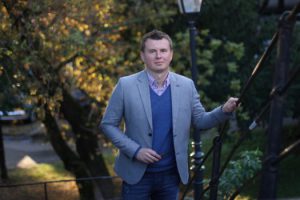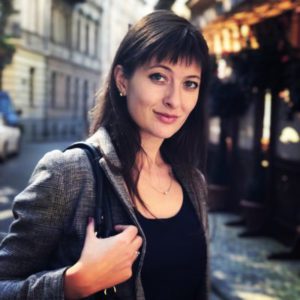Russia’s identity and foreign policy: understanding the roots of the international crisis
When?: March 1st 2022, 3:15pm
Where?:https://mau-se.zoom.us/j/64913784119
The seminar will focus on the role of identity in Russian foreign policy making and the trajectories that Russian identity formation has followed since the break-up of the Soviet Union. What are the main Russian concepts of the collective Self and how have they been connected to the Western Other? What is the function of supranational identitary constructs such as Eurasianism or Russian civilizationism? What role did identity play in the 2014 Ukraine crisis and the current tensions around Ukraine? How does the authoritarian regime in Russia instrumentalize identity? What are the possible policy implications and how should we approach Russian behavior based on our understanding of identity?

Dr. Aliaksei Kazharski received his PhD from Comenius University in Bratislava (Slovakia) in 2015. As a doctoral student, he spent time as a guest researcher at the University of Oslo (Norway), University of Tartu (Estonia) and the Institute for Human Sciences in Vienna (Austria). He has also been a visiting researcher at the University of Vienna and has worked as a researcher and lecturer at Charles University in Prague (Czech Republic) and Comenius University in Bratislava. Aliaksei’s doctoral dissertation was published by Central European University Press as a monograph in 2019 (Eurasian Integration and the Russian World: Regionalism as an Identitary Enterprise). He has also contributed to the work of regional think tanks and debate platforms such as the GLOBSEC Policy Institute and Visegrad Insight. Aliaksei’s main areas of research have been Central and Eastern Europe, Russia, regionalism and regional integration, and identity in international relations. He has published his scholarship on these subjects in Geopolitics, Problems of Post-Communism and other academic journals with an international impact.






 The recent rise of illiberal, conservative and right-wing populist movements poses an acute threat to democracy and equality in Europe. One pervasive but underresearched strand of these movements advocates ‘traditional family values’, in particular conservative sexual and gender politics, in the name of protecting children. With my project, l plan to fill this research gap through interdisciplinary research examining the discursive construction of the child as the ultimate site of vulnerability and risk, and hence in need of protection and policy intervention. The research is characterised by a significant comparative dimension, analysing discourses by conservative, ‘pro-traditional family values’ actors, from politicians to activists, in Germany and Russia. In my presentation for RUCARR, I will focus on Russian actors’ ‘traditional values’ discourse and -policies as they pertain to children.
The recent rise of illiberal, conservative and right-wing populist movements poses an acute threat to democracy and equality in Europe. One pervasive but underresearched strand of these movements advocates ‘traditional family values’, in particular conservative sexual and gender politics, in the name of protecting children. With my project, l plan to fill this research gap through interdisciplinary research examining the discursive construction of the child as the ultimate site of vulnerability and risk, and hence in need of protection and policy intervention. The research is characterised by a significant comparative dimension, analysing discourses by conservative, ‘pro-traditional family values’ actors, from politicians to activists, in Germany and Russia. In my presentation for RUCARR, I will focus on Russian actors’ ‘traditional values’ discourse and -policies as they pertain to children. Varför utgör Navalnyj en sådan utmaning mot Putin och det etablissemang han leder?
Varför utgör Navalnyj en sådan utmaning mot Putin och det etablissemang han leder?

 Limits of Commitment: Responses of Junior Allies to Hegemonic Entrapment
Limits of Commitment: Responses of Junior Allies to Hegemonic Entrapment This panel was originally proposed to, and accepted by, the annual convention of the International Studies Association to be held in Las Vegas, April 6-9. As the convention for known reasons moved into a virtual mode, we decided to hold this panel outside of the formal ISA framework.
This panel was originally proposed to, and accepted by, the annual convention of the International Studies Association to be held in Las Vegas, April 6-9. As the convention for known reasons moved into a virtual mode, we decided to hold this panel outside of the formal ISA framework.